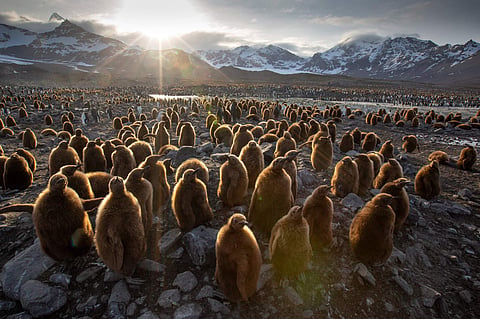Seven Worlds, One Planet Review: An awe-inspiring, cautionary wildlife documentary series
Rating:(3.5 / 5)
India finally gets to watch BBC Natural History Unit's latest production — Seven Worlds, One Planet — starting Monday, January 20 on Sony BBC Earth. The seven-part documentary series, narrated by the inimitable David Attenborough, shows us the diversity of life on each of the seven continents on earth. It introduces us to the lives of our fellow creatures that we share our planet with and notably, tells us how the very existence of many of these wonderful species is endangered by the climate change we have precipitated.
And this is not just a passing remark on how human behaviour threatens one particular species but the central theme of the entire series (from what I could tell based on the advanced copy of the first two episodes we received). The second episode, Asia, for instance, begins at the northern end of the continent where we're shown an overhead shot of what Attenborough tells us is "one of the biggest gatherings of mammals to be found anywhere on earth." The camera moves in closer and we're shown the unbelievably large group of Pacific walrus huddled together on a small stretch of beach. Before we can finish staring at them in awe, wondering at this incredible phenomenon, our narrator tells us that climate change is in fact what has driven them here. These walrus used to rest on the sea ice out the arctic ocean, but now, with the ice melting rapidly, they are left with no place to go except a few beaches where they are packed together by the hundreds of thousands. This unnatural gathering leads to tragic consequences for the walrus, many of which die here. The series is clearly not holding back any punches.
This is quite unusual for a nature documentary, especially one narrated by Attenborough, whose work has mostly focused on the wonder and grandeur of the natural world, not touching much on effect humans have on it. The famous presenter has, in fact, come under fire in the past for not using his voice to impress upon the general public the destruction our species has wrought and is still causing to our planet and the other animals we share it with. So it is a much-needed and refreshing change to hear him tell the bare, brutal truth. "This may be the most critical moment for life on earth since the continents formed. We are changing the world so rapidly that wildlife is facing some of its greatest challenges yet," he says in his introduction to Seven Worlds, One Planet. Then he goes on to highlight some specific examples of this throughout the series, as described above.
However, Seven Worlds, One Planet is not all bleak. We do get to see breathtaking footage of some truly remarkable life on earth. The series brings us never-before-seen visuals like those of the rare (and extremely adorable looking) golden snub-nosed monkeys that live in the mountainous forests of China and the wondrous ecosystem in the depths of the ocean under the Antarctic ice. It also gives us light-hearted sequences like the one of king penguin chicks that just won't stay put where their parents leave them and go exploring about only to get lost — fortunately, just temporarily. And finally, there is a glimmer of hope as well. The same Asia episode that opens on such a sombre note, ends with fishermen in South East Asia who choose to feed whale sharks some of their catch, instead of hunting them, thus providing hope for this endangered species.
"Never has it been a more important time to reveal the precious diversity of life on our seven continents," says Attenborough at the outset and he is quite right too. We must revel in the wonders of our planet and understand the importance of preserving them. It's the only way to bring about sustained change in our way of thinking and lives. Seven Worlds, One Planet helps us do just that.
(Seven Worlds, One Planet premieres Monday, January 20 at 9 pm on Sony BBC Earth)

